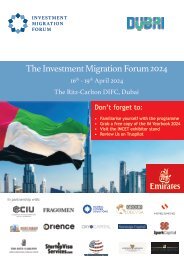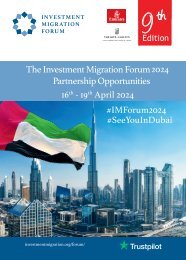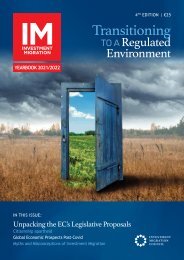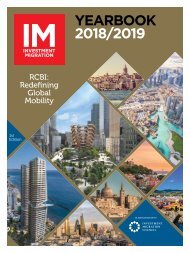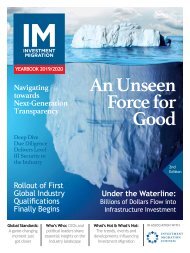IM Yearbook 2020/21
Born from the need for a global, credible, “go-to” publication, the 3rd IM Yearbook offers valuable access to a prime target audience of top industry influencers, decision makers, and the foremost referral network to the world’s most influential Investment Migration programmes: Government officials such as Heads of CIU’s, policy makers, academics, migration agents, law firms, wealth managers, financial advisors, real estate developers, and international firms involved in investment migration.
Born from the need for a global, credible, “go-to” publication, the 3rd IM Yearbook offers valuable access to a prime target audience of top industry influencers, decision makers, and the foremost referral network to the world’s most influential Investment Migration programmes: Government officials such as Heads of CIU’s, policy makers, academics, migration agents, law firms, wealth managers, financial advisors, real estate developers, and international firms involved in investment migration.
You also want an ePaper? Increase the reach of your titles
YUMPU automatically turns print PDFs into web optimized ePapers that Google loves.
two stages: administrative and judicial. Under<br />
the first stage, the Commission will make<br />
various attempts to negotiate an agreement<br />
with the member state concerned informally<br />
and usually by exchange of correspondence,<br />
documents, data etc. If no agreement is<br />
achieved in the pre-infringement stage<br />
and the Commission decides to initiate an<br />
infringement procedure, it will send a formal<br />
notice to the member state. The member<br />
state is then given the opportunity to submit<br />
its observations. After the member state’s<br />
submission, the Commission decides whether<br />
to deliver a reasoned opinion explaining<br />
why it considers that the member state has<br />
failed to fulfil its Treaty obligations. Once the<br />
member state has replied to the Commission’s<br />
reasoned opinion or the lack thereof, the<br />
Commission will refer the matter to the<br />
ECJ and thus start the judicial procedure.<br />
The infringement procedures<br />
against Cyprus and Malta have now<br />
been initiated with the formal notices<br />
sent by the Commission. What is less<br />
clear, however, is what arguments the<br />
Commission would use with regard to the<br />
obligations under the Treaties that these<br />
two member states allegedly failed to<br />
fulfil if this case is brought to the court.<br />
The EC’s objections are partially based<br />
on the concept of “genuine links”. What<br />
can you tell us about this notion?<br />
In its Press Release on the matter, the<br />
European Commission stated that it<br />
‘considers that the granting by these member<br />
states of their nationality – and thereby<br />
EU citizenship – in exchange for a predetermined<br />
payment or investment and<br />
without a genuine link with the member<br />
states concerned, is not compatible with the<br />
principle of sincere cooperation enshrined<br />
in Article 4(3) of the Treaty on European<br />
Union. This also undermines the integrity<br />
of the status of EU citizenship provided<br />
for in Article 20 of the Treaty on the<br />
Functioning of the European Union’.<br />
The Commission will most likely argue<br />
that Cyprus and Malta failed to fulfil their<br />
obligations under Article 4(3) TEU and<br />
Article 20 TFEU by granting nationality<br />
in exchange for payment or investment<br />
and without genuine link. This argument<br />
is, however, somewhat problematic.<br />
First of all, the ‘genuine link’ theory<br />
has not developed into obligatory rules<br />
or principles of international law, let<br />
alone in EU law which provides for<br />
non-discrimination on the basis of<br />
nationality. Trying to impose a ‘genuine<br />
link’ requirement on member states with<br />
regard to their criteria for acquisition of<br />
citizenship would not only be incompatible<br />
with EU law but would also almost<br />
certainly spark ethnic nationalism and<br />
undermine the values of the Union itself.<br />
Secondly, it is difficult to imagine that<br />
the principle of sincere cooperation could<br />
be successfully invoked in the context<br />
of these cases. Article 4(3) concerns the<br />
achievement of EU objectives and genuine<br />
compliance with EU law, none of which<br />
seems to be related with the investment<br />
programmes. A possible infringement<br />
of that provision could be imagined in<br />
the case of mass naturalisation, which<br />
may have a significant negative impact<br />
on the internal market. This is where a<br />
member state confers its citizenship to a<br />
large, disproportional numbers of thirdcountry<br />
nationals. However, this doesn’t<br />
seemed to be the case with Cyprus and<br />
Malta because the number of citizenship<br />
granted through their investment<br />
programmes remained low in general<br />
and compared to the number of other<br />
naturalisations in the EU in particular.<br />
Dr Elena Basheska<br />
BIO is an independent<br />
legal researcher<br />
and EU/international<br />
affairs consultant/<br />
advisor. She holds an LLM<br />
in European law and a<br />
PhD in EU law from the<br />
University of Groningen<br />
(The Netherlands). Elena<br />
has extensive experience<br />
as a researcher, working<br />
previously in various<br />
sectors, including<br />
academia, NGOs, law<br />
firms and professional<br />
organisations. Her<br />
research interests focus<br />
on EU enlargement,<br />
EU external relations,<br />
citizenship, and protection<br />
of human rights.<br />
Investment Migration <strong>Yearbook</strong> 2O2O/2O<strong>21</strong> 33




